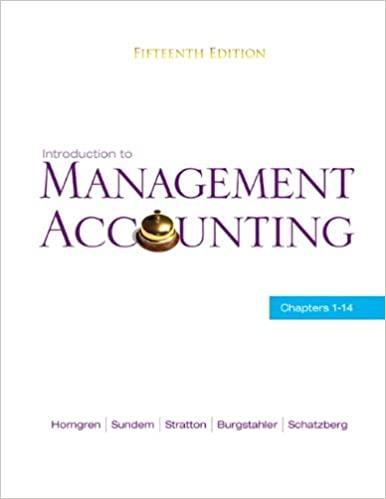| | Waterways Problem 05 The Vice President for Sales and Marketing at Waterways Corporation is planning for production needs to meet sales demand in the coming year. He is also trying to determine how the companys profits might be increased in the coming year. This problem asks you to use cost-volume-profit concepts to help Waterways understand contribution margins of some of its products and decide whether to mass-produce any of them. Waterways markets a simple water control and timer that it mass-produces. Last year, the company sold 721,000 units at an average selling price of $3.50 per unit. The variable costs were $1,766,450, and the fixed costs were $529,935. | | | | | What is the products contribution margin ratio? (Round ratio to 0 decimal places, e.g. 25%.) | Contribution margin ratio | | | % | | | | | | What is the companys break-even point in units and in dollars for this product? | Break-even point in units | | | units | | Break-even point in dollars | | $ | | | | | | | What is the margin of safety, both in dollars and as a ratio? (Round ratio to 0 decimal places, e.g. 25%.) | Margin of safety in dollars | | $ | | | Margin of safety ratio | | | % | | | | | | If management wanted to increase its income from this product by 10%, how many additional units would have to be sold to reach this income level? | Waterways would have to sell an additional | | | units | | | | | | If sales increase by 51,000 units and the cost behaviors do not change, how much will income increase on this product? | Income will increase by | | $ | | | | | | Waterways is thinking of mass-producing one of its special-order sprinklers. To do so would increase variable costs for all sprinklers by an average of $0.70 per unit. The company also estimates that this change could increase the overall number of sprinklers sold by 10%, and the average sales price would increase $0.20 per unit. Waterways currently sells 490,000 sprinkler units at an average selling price of $28.60. The manufacturing costs are $7,866,260 variable and $2,011,486 fixed. Selling and administrative costs are $2,644,240 variable and $809,370 fixed. If Waterways begins mass-producing its special-order sprinklers, how would this affect the company? (Round ratio to 0 decimal places, e.g. 5% and Net income to 0 decimal places, e.g. 2,520.) | | | Current | | | New | | | Effect | | | Contribution margin ratio | | | % | | | % | | IncreaseDecrease | | by | | | % | | Net income | | $ | | | $ | | | IncreaseDecrease | | by | | $ | | | | | | | Waterways is thinking of mass-producing one of its special-order sprinklers. To do so would increase variable costs for all sprinklers by an average of $0.70 per unit. The company also estimates that this change could increase the overall number of sprinklers sold by 10%, and the average sales price would increase $0.20 per unit. Waterways currently sells 490,000 sprinkler units at an average selling price of $28.60. The manufacturing costs are $7,866,260 variable and $2,011,486 fixed. Selling and administrative costs are $2,644,240 variable and $809,370 fixed. If the average sales price per sprinkler unit did not increase when the company began mass-producing the special-order sprinkler, what would be the effect on the company? (Round answers to 0 decimal places, e.g. 5% or 2,520.) | Contribution margin ratio | | IncreaseDecrease | | by | | | % | | Profit | | IncreaseDecrease | | by | | $ | | | | | | |






